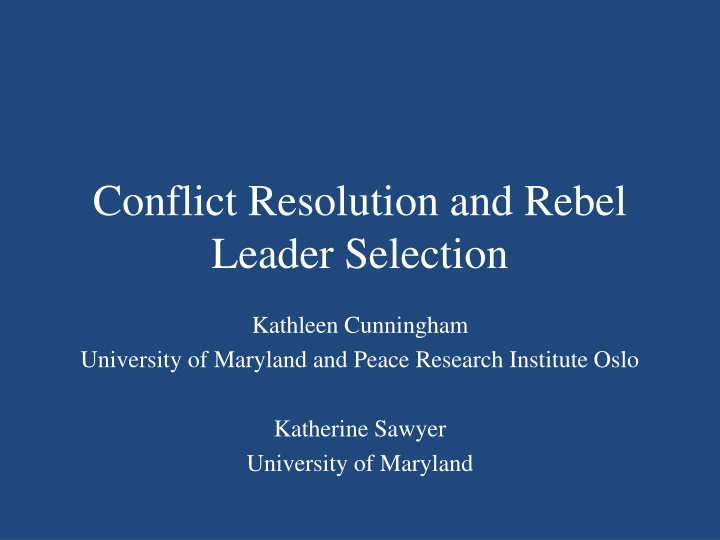
Rebel Leader Selection and Conflict Resolution Study
Explore the research on rebel leader selection through quasi-democratic processes and its impact on negotiation outcomes and conflict termination. The study analyzes case histories, hypotheses, methods, and empirical results to understand the implications of rebel leader ascension types on peace processes.
Uploaded on | 1 Views
Download Presentation

Please find below an Image/Link to download the presentation.
The content on the website is provided AS IS for your information and personal use only. It may not be sold, licensed, or shared on other websites without obtaining consent from the author. If you encounter any issues during the download, it is possible that the publisher has removed the file from their server.
You are allowed to download the files provided on this website for personal or commercial use, subject to the condition that they are used lawfully. All files are the property of their respective owners.
The content on the website is provided AS IS for your information and personal use only. It may not be sold, licensed, or shared on other websites without obtaining consent from the author.
E N D
Presentation Transcript
Conflict Resolution and Rebel Leader Selection Kathleen Cunningham University of Maryland and Peace Research Institute Oslo Katherine Sawyer University of Maryland
Theory Quasi-democratic rebel leader selection Rebel leader selected through voting Examples: Congolese Democratic Coalition, 1999 All Bodo Student Union, 1986
Theory Continued Quasi-democratic rebel leader selection Signal: Legitimacy and authority Group coherence Driven by: Organizational culture Group aims (democracy) Credibility concerns
Rebel Leader Data Case histories by group Ascension type and date Categories of ascension types: Election Founder Inherited/Non-democratic Split Merged Third party Rebel officer
Rebel Leader Data Continued Figure 1. Distribution of Rebel Leadership Ascension by Type
Hypotheses Hypothesis 1: Rebel groups with quasi-democratically selected leaders are more likely to be negotiated with. Hypothesis 2: Rebel groups with quasi-democratically selected leaders are more likely to see civil war end.
Methods Two tests: Bivariate probit model Cox proportional hazard model Dependent Variables: Negotiations and Conflict Termination Independent Variable: Quasi-democratically elected leader (compared to all other types) Covariates: Secondary support, troop strength, legal political wing, democracy, ethnic fractionalization, population, GDPpc
Empirical Results Figure 2. Marginal Effects: Joint Probability of Negotiations and Conflict Termination
Endogeneity Empirical models Negotiations do not predict elections Elections difficult to model empirically Theoretical implications Elections costly signal Failed elections Significant consequences
Concluding Remarks Quasi-democratically elected leaders Increases probability of: Negotiations Conflict Termination Thanks!
